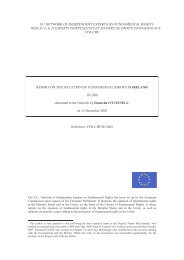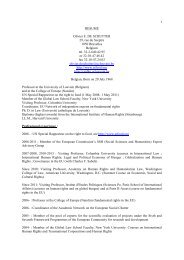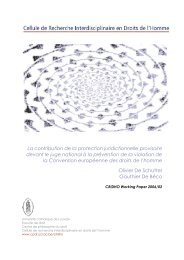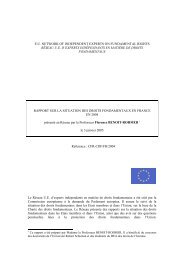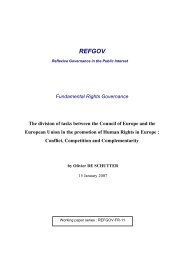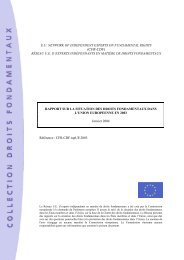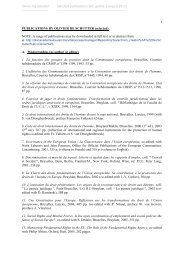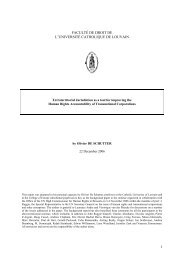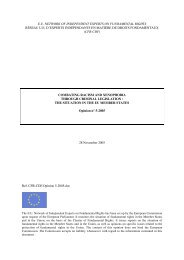The Prohibition of Discrimination under European Human ... - cridho
The Prohibition of Discrimination under European Human ... - cridho
The Prohibition of Discrimination under European Human ... - cridho
Create successful ePaper yourself
Turn your PDF publications into a flip-book with our unique Google optimized e-Paper software.
thematic report<br />
■ THE PROHIBITION OF DISCRIMINATION UNDER EUROPEAN HUMAN RIGHTS LAW ■<br />
been relatively few prosecutions (31) and only a few convictions (four, at the date <strong>of</strong> his application), this showed<br />
that there was a discriminatory use <strong>of</strong> lethal force and a lack <strong>of</strong> legal protection vis-à-vis a section <strong>of</strong> the<br />
community on grounds <strong>of</strong> national origin or association with a national minority ». 30 Although the Court in that<br />
case was led to find a violation <strong>of</strong> the right to life protected <strong>under</strong> Article 2 ECHR because <strong>of</strong> the lack <strong>of</strong><br />
appropriate investigations in the death <strong>of</strong> the son <strong>of</strong> the applicant, it rejected the claim <strong>of</strong> discrimination, noting<br />
that mere statistical data would not suffice to prove discrimination as prohibited <strong>under</strong> Article 14 ECHR :<br />
Where a general policy or measure has disproportionately prejudicial effects on a particular group, it is not<br />
excluded that this may be considered as discriminatory notwithstanding that it is not specifically aimed or<br />
directed at that group. However, even though statistically it appears that the majority <strong>of</strong> people shot by the<br />
security forces were from the Catholic or nationalist community, the Court does not consider that statistics can<br />
in themselves disclose a practice which could be classified as discriminatory within the meaning <strong>of</strong> Article 14. 31<br />
Although it appears reluctant to recognize disparate impact discrimination by allowing for discrimination to be<br />
proved by statistical data, the Court is aware <strong>of</strong> the need to adapt the evidentiary requirements imposed on the<br />
victim to the specific character <strong>of</strong> discrimination, which remains most <strong>of</strong>ten obfuscated. In Nachova, where it<br />
was confronted with the killing by State agents <strong>of</strong> two deserters <strong>of</strong> Roma origin and the ensuing lack <strong>of</strong><br />
effective investigations, 32 the Court referred to the provisions relating to the pro<strong>of</strong> <strong>of</strong> discrimination in Council<br />
Directive 2000/43/CE <strong>of</strong> 29 June 2000 implementing the principle <strong>of</strong> equal treatment between persons<br />
irrespective <strong>of</strong> racial or ethnic origin and Council Directive 2000/78/CE <strong>of</strong> 27 November 2000 establishing a<br />
general framework for equal treatment in employment and occupation, and concluded that « it has become an<br />
established view in Europe that effective implementation <strong>of</strong> the prohibition <strong>of</strong> discrimination requires the use<br />
<strong>of</strong> specific measures that take into account the difficulties involved in proving discrimination (…). <strong>The</strong> Court<br />
has also emphasised the need for a broad interpretation <strong>of</strong> the protection provided by Article 14 <strong>of</strong> the<br />
Convention (see Thlimmenos, cited above, § 44). Member States have expressed their resolve to secure better<br />
protection against discrimination by opening for ratification Protocol No. 12 to the Convention ». 33 It<br />
considered therefore that<br />
in cases where the authorities have not pursued lines <strong>of</strong> inquiry that were clearly warranted in their<br />
investigation into acts <strong>of</strong> violence by State agents and have disregarded evidence <strong>of</strong> possible discrimination,<br />
[the <strong>European</strong> Court <strong>of</strong> <strong>Human</strong> Rights] may, when examining complaints <strong>under</strong> Article 14 <strong>of</strong> the Convention,<br />
draw negative inferences or shift the burden <strong>of</strong> pro<strong>of</strong> to the respondent Government. 34<br />
This position <strong>of</strong> the Court contrasts with its previously much more cautious attitude when it was confronted with<br />
the allegation that State authorities had committed racial discrimination. It may be explained by a refusal <strong>of</strong> the<br />
Court to see a State benefit from its own wrong : when confronted with the allegation that killings by State agents<br />
were committed with racial overtones, States are <strong>under</strong> a positive obligation to pursue an <strong>of</strong>ficial investigation<br />
with vigour and impartiality, having regard to the need to reassert continuously society's condemnation <strong>of</strong> racism<br />
and ethnic hatred and to maintain the confidence <strong>of</strong> minorities in the ability <strong>of</strong> the authorities to protect them<br />
30<br />
31<br />
32<br />
33<br />
34<br />
Ibid., § 152.<br />
Ibid., § 154.<strong>The</strong> same wording was adopted by a Chamber constituted within another section <strong>of</strong> the Court in the case <strong>of</strong> McShane v. the United<br />
Kingdom, which raised similar issues : see Eur. Ct. HR (4th sect.), McShane v. the United Kingdom (Appl. N° 43290/98), judgment <strong>of</strong> 25 May 2002,<br />
§§ 132-136.<br />
Eur. Ct. HR (1st sect.), Nachova and Others v. Bulgaria (Appl. N° 43577/98 and 43579/98), judgment <strong>of</strong> 26 February 2004, § 158.<strong>The</strong> judgment has<br />
now been referred to the Grand Chamber <strong>of</strong> the Court.<br />
Ibid., § 168.<br />
Ibid., § 169.<br />
18



